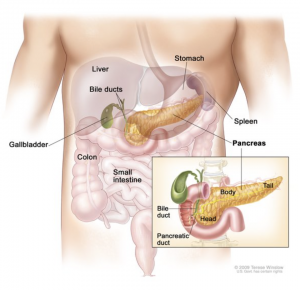 Congenital hyperinsulinism is a condition causing abnormally high levels of insulin, a hormone that helps control blood sugar levels. People with this condition have frequent episodes of low blood sugar (hypoglycemia). In infants and young children, these episodes are characterized by a lack of energy (lethargy), irritability, or difficulty feeding. Repeated episodes of low blood sugar increase the risk for serious complications such as breathing difficulties, seizures, intellectual disability, vision loss, brain damage, and coma.
Congenital hyperinsulinism is a condition causing abnormally high levels of insulin, a hormone that helps control blood sugar levels. People with this condition have frequent episodes of low blood sugar (hypoglycemia). In infants and young children, these episodes are characterized by a lack of energy (lethargy), irritability, or difficulty feeding. Repeated episodes of low blood sugar increase the risk for serious complications such as breathing difficulties, seizures, intellectual disability, vision loss, brain damage, and coma.
Congenital hyperinsulinism affects approximately 1 in 50,000 newborns. This condition is more common in certain populations, affecting up to 1 in 2,500 newborns.
The severity of of this disease varies widely among affected individuals, even among members of the same family. About 60 percent of infants with this condition experience a hypoglycemic episode within the first month of life. Other affected children develop hypoglycemia by early childhood. Unlike typical episodes of hypoglycemia, which occur most often after periods without food (fasting) or after exercising, episodes of hypoglycemia in people with congenital hyperinsulinism can also occur after eating.
Other Names: Persistent hyperinsulinemic hypoglycemia of infancy; PHHI; Hyperinsulinemic hypoglycemia familial; Hypoglycemia hyperinsulinemic of infancy; Hyperinsulinism familial with pancreatic nesidioblastosis; Nesidioblastosis of pancreas; Hyperinsulinism congenital; Hyperinsulinemic hypoglycemia due to focal adenomatous hyperplasia; CHI; Familial hyperinsulinism; Congenital isolated hyperinsulinism
Resources
Genetic and Rare Diseases (GARD) Information Center
For more information on rare genetic disorders, visit https://checkrare.com/diseases/congenital-and-genetic-conditions/
